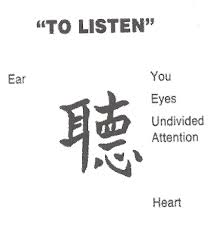 As a member of ASCD, I receive their monthly Education Updates in the mail. Normally, I give it a cursory reading, but the lead article in the December issue, “More than Words: Developing Core Speaking and Listening Skills” made me pause. As librarians –and teachers—we focus most of our attention on reading and reading comprehension, but learning occurs in social interchanges that we have been overlooking.
As a member of ASCD, I receive their monthly Education Updates in the mail. Normally, I give it a cursory reading, but the lead article in the December issue, “More than Words: Developing Core Speaking and Listening Skills” made me pause. As librarians –and teachers—we focus most of our attention on reading and reading comprehension, but learning occurs in social interchanges that we have been overlooking.
Active listening allows us to develop better relationships with our colleagues and administrators. The skill requires first and foremost listening to what the other person is saying without thinking about what your response will be. Techniques include restating what you think you heard and asking clarifying questions. More details can easily be found in an Internet search.
ASCD says our students need to develop the same skill set. The article suggests “Bounce Cards” to coach students (NOTE: the original use of Bounce Cards are actually pieces of material used in photography to bounce light back toward the subject!) . The card includes “bounce” statements such as “that reminds me of…” and “I agree, because …” followed with summing up statements such as “So, if I understood you correctly …” and “I like how you said…” Finally, there are inquiring statements such as “I am not sure I understand …” and “Can you tell me more about that?” We need to give students the help they need to become better listeners, and we also must model the behavior.
Elsewhere in the same issue there is an article on Targeting Feedback to Support Self Regulation (even Cookie Monster is working on this). Too often we speak thoughtlessly not realizing the interpretation the listener is putting on our remarks. If we tell a student she did well on a task and must be smart, when she doesn’t do well, she will feel stupid. Praise the work and the effort not the result. Be specific in your praise—and only when deserved, and provide students with tools for self-assessment. The AASL Standards for the 21st-Century Learner have a whole strand devoted to it.
As I thought about the concept of feedback, it occurred to me that by praising only success (the outcome) we are promoting a fear of failure, and, as I blogged a few weeks ago, true success only comes from dealing with failure. By listening and speaking with heightened awareness we will help our students to do better, and we will be building stronger relationships within our educational community. And then,perhaps, we may find a way to actively and appropriately praise mistakes as well.
